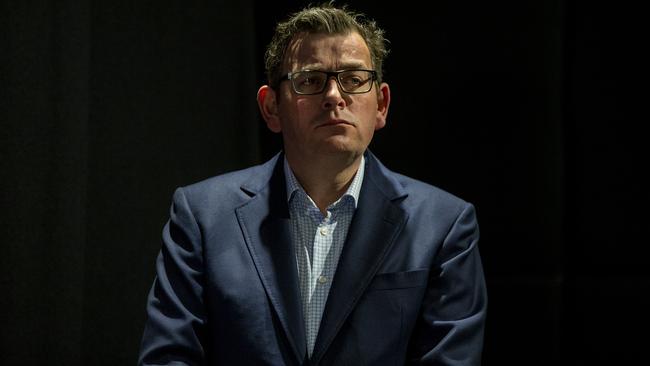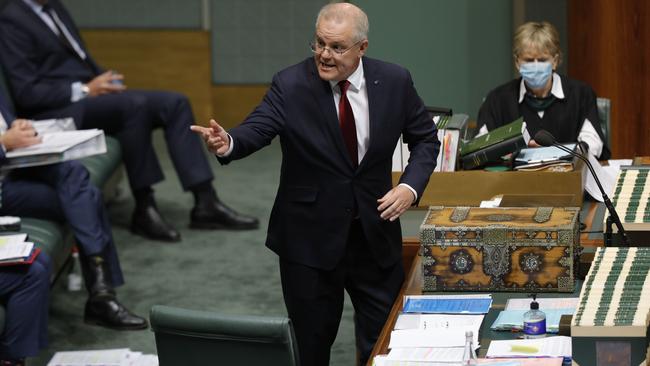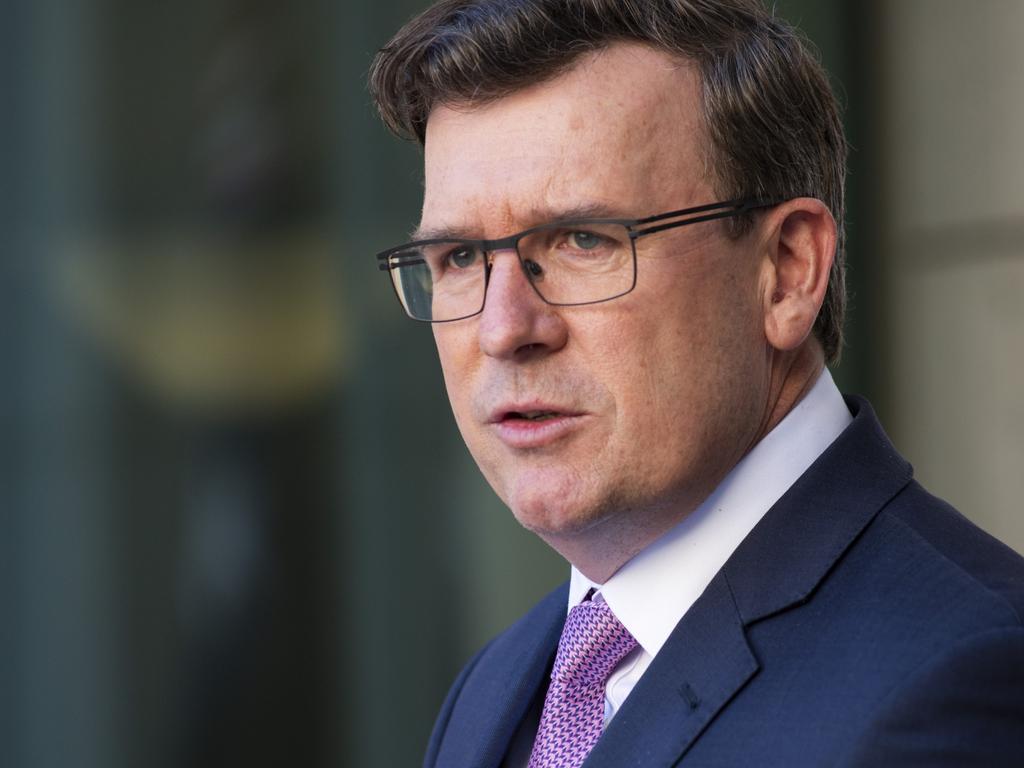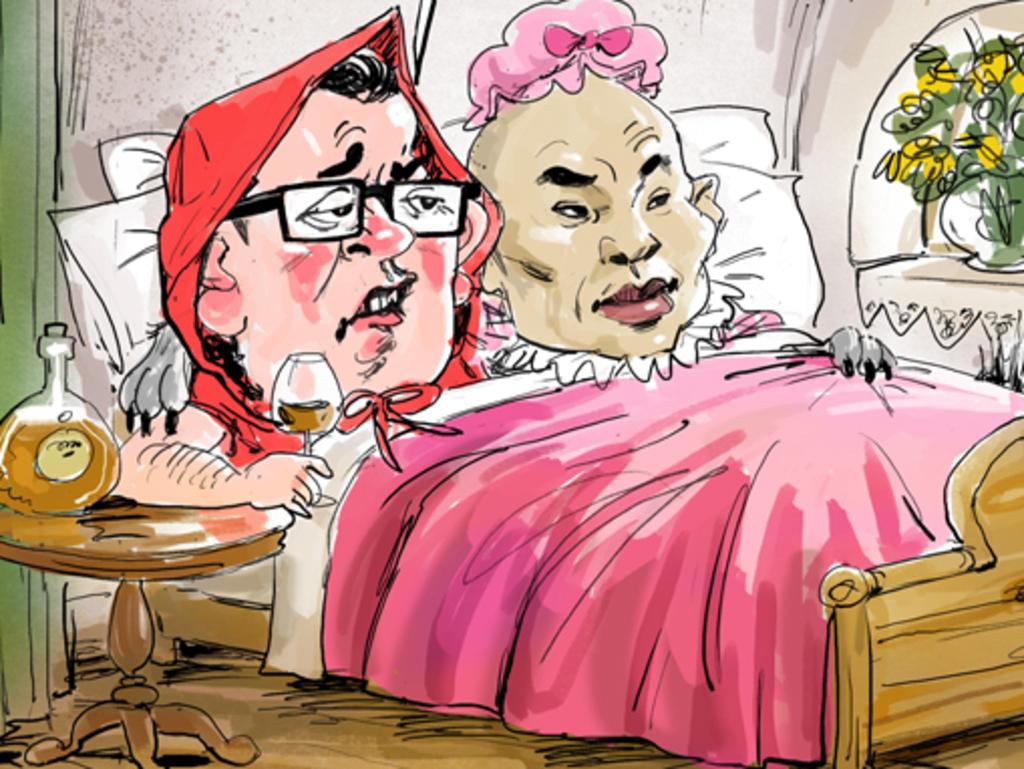Daniel Andrews’ eyes wide shut on Chinese spy threat
Daniel Andrews failed to take up multiple offers from intelligence and security officials for classified briefings on Chinese interference.

Victorian Premier Daniel Andrews failed to take up multiple offers from the country’s highest-ranking intelligence and security officials to provide classified briefings on Chinese interference, including general concerns about Belt and Road deals with Beijing.
Despite Mr Andrews claiming the first he heard of a proposed Morrison government crackdown on state government and university deals with foreign powers was on Wednesday night, it emerged that Scott Morrison and national security chiefs made several unsuccessful attempts to brief him over the past month on China concerns.
Mr Andrews was warned by the Prime Minister about the federal government’s concerns with the Labor Premier’s BRI deal in a letter sent in June. The Victorian Labor leader was unable to attend a classified briefing to the premiers and chief ministers from security chiefs and the Prime Minister on July 31.
Pushing back against Mr Morrison’s move to use external affairs powers stop deals deemed to work against national interests, Mr Andrews claimed the first he heard of the proposed legislation was late on Wednesday. “I got a letter last night,” he said.
The federal government revealed Australian Security Intelligence Organisation head Mike Burgess, Australian Signals Directorate chief Rachel Noble and Office of National Intelligence director Nick Warner made several offers through official channels to the Andrews government over the past four weeks.
The briefings to premiers and chief ministers last month are believed to have covered the agencies’ threat assessments on the broader strategic picture relating to China, espionage and foreign interference as well as the cyber threat. They also are also believed to have included general security assessments of BRI agreements but not believed to have related specifically to the Victorian deal.

Mr Andrews has been offered the briefing several times since July but has yet to take it up, undermining his claims he was left unaware of concerns until this week.
The Premier, who has clashed with the federal government in recent weeks over his handling of the COVID-19 crisis in Victoria, questioned Mr Morrison’s focus during the pandemic and declared he was “exclusively focused on fighting” COVID-19.
“If the Prime Minister’s got time to be doing those things, then that’s fine for him. I don’t,” Mr Andrews said.
“I am exclusively focused on fighting this virus and then making sure that we have got the strongest economy that we can possibly have on the other side of this.”
On Thursday, Beijing denounced the proposed Foreign Relations Bill allowing the Morrison government to rescind Victoria’s BRI agreement, and accused Australia of “putting bacteria” into the relationship. “China’s co-operation with the Victorian state under the BRI has enhanced the benefits for people on both sides of the deal,” China’s Foreign Ministry spokesman Zhao Lijian said.
“We hope Australia will view such co-operation objectively and reasonably, and stop putting bacteria into this relationship and do more to improve our mutual benefits.”
Mr Morrison, who wrote to Mr Andrews in June about Victoria’s BRI agreement, said he arranged a special briefing for state and territory leaders “to know what I know” about threats to Australia’s interests and national security.
“That was a useful briefing we held some weeks ago and I think what we’ve announced … is therefore not unsurprising or unexpected on their part,” the Prime Minister said. “We need to all work together to protect Australia’s national interests and I think this bill, these laws, will aid us in doing that.”
Mr Andrews called on Mr Morrison to provide a list of new foreign markets with “just as much demand” as China and defended his deal with Beijing, saying Victoria relied heavily on international students due to its lack of natural resources.
“I dare say that, given the announcements the Prime Minister’s made … he’ll no doubt very soon be able to list a full range of other free trade agreements and other markets that we’ll be sending Victorian products to — I look forward to that,” he said.
Mr Andrews last year signed-up to President Xi Jinping’s BRI program, which is used as a vehicle by the Chinese Communist Party to expand Beijing’s soft power reach in the region. The BRI deals have raised alarm bells in intelligence and security agencies amid heightening levels of Chinese espionage and coercive influence.
Victoria’s BRI framework — deepening co-operation on infrastructure, innovation and trade development — is expected to be one of the first major agreements to fall under Mr Morrison’s Foreign Relations Bill, which will be tabled to parliament next week.
West Australian Premier Mark McGowan accepted that foreign affairs was the responsibility of the commonwealth and said his government had conducted an initial audit of agreements that had identified a 2011 memorandum of understanding with Beijing signed by Colin Barnett.
Mr McGowan said WA — Australia’s resources powerhouse — must be allowed to pursue economic arrangements with key trading partners. Mr Barnett, the former Liberal WA premier who signed the agreement with China’s powerful National Development Reform Commission in 2011, described the government’s proposed laws as “very poor policy” and “divisive”.
“The agreements that Western Australia has had (with China) have always been centred around economic development and goodwill,” Mr Barnett said.
“If it becomes in place, it will set a whole new layer of bureaucracy in economic development. It’s a real threat to the resources industry. The commonwealth has not handled the relationship with China well over the last decade. It’s a very poor approach.”
Warwick Smith, the nation’s leading business broker on China, backed the government’s initiative and described it as “common sense” given the “plethora” of agreements in place between Australia and China.
“To have some standards … and accountability for all of those things — they won’t just be with China — would be really beneficial to enable us to be much more directed as a nation in maximising soft diplomacy benefits which assist our long terms agendas and our trade diversity which is a continuing objective,” Mr Smith said.
Anthony Albanese recommitted federal Labor not to signing up to China’s BRI and said the opposition would examine the government’s legislation next week.
Opposition legal affairs spokesman Mark Dreyfus labelled Mr Morrison’s push to veto foreign deals with state governments as “Trumpian” and a distraction from the government’s role in the sale of the Port of Darwin to a Chinese interests.
Liberal state leaders — including South Australian Premier Steven Marshall and Tasmanian Premier Peter Gutwein — flagged support for the federal government audit into deals with foreign powers.
ADDITIONAL REPORTING: WILL GLASGOW, PAIGE TAYLOR, MATTHEW DENHOLM







To join the conversation, please log in. Don't have an account? Register
Join the conversation, you are commenting as Logout